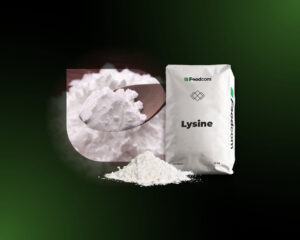- Amino Acids are crucial for livestock development, protein synthesis, and bodily functions, leading to enhanced productivity and profitability.
- Amino Acids are categorized as essential and non-essential. Non-essential Amino Acids are produced in the body, while essential ones must be obtained through diet.
- Most common animal fodder contains inadequate amounts of Amino Acids, thus supplementation is necessary.
Take a look at our guide to animal diet supplementation with Amino Acids. Discover what they are and how you can use them to enhance the performance of your livestock and improve business profitability. Learn which amino acids are the most beneficial for poultry, cows, and swine nutrition.
What are amino acids and what is their role in animal feed?
Amino Acids play a key role in animal nutrition as they form an essential basis for the proper development and function of the animal body. In the vast majority of animal bodies, proteins are the basic building blocks and Amino Acids are their fundamental components. There are 20 important Amino Acids.
The main function of Amino Acids is to enable the process of protein synthesis, which results in the formation of cell, tissue and muscle structures. Without an adequate supply of Amino Acids, the animal body is unable to efficiently synthesize the proteins required for tissue regeneration, growth and muscle maintenance and repair.
In addition, Amino Acids fulfill important metabolic functions by regulating processes such as digestion, nutrient transport, enzyme and hormone production. They are also essential for maintaining a healthy immune system in animals.
Two main categories of amino acids
There are two categories of amino acids: essential and non-essential. Non-essential amino-acids are produced within the body from other amino acids or compounds. The name can be misleading as those amino acids play an important role. They take part in processes such as metabolism, digestion, fertility, and immune responses.
On the other hand, essential amino acids cannot be synthesized within the organism and need to be included in the diet. As common grain-based feeds fail to provide a sufficient amount of amino acids, farmers tend to enhance the animal diets with added components.
Essential Amino Acids offered by Foodcom S.A.
Foodcom S.A. is a supplier of the most common amino acids for animal nutrition: lysine, methionine, threonine, and tryptophan. Essential amino acids offered by our company are obtained through the process of microbial fermentation or thorugh chemical process and are commonly used to supplement various animal feeds.
Lysine
Lysine is responsible for activating enzymatic reactions, protein synthesis, and bone development. It also plays an important role in carbohydrate metabolism and calcium absorption. Ensuring sufficient levels of lysine in the animal diet results in lower feed costs and enhanced performance. The product is added to feed premixes in order to maintain the desired level of lysine which can be insufficient in other protein sources such as corn (0.22%) and wheat (0.3%). Lysine is added to feed rations for swine, poultry, dairy cows, and fish.
In swine nutrition, lysine is the first limiting amino acid, meaning that it is the first amino acid to become deficient in the diet as the demand for lysine is higher than the amount included in the feed.
In the poultry diet, lysine is the second limiting amino acid. Chicken diet increased with lysine is responsible for a decreased fetal mortality and helps the development of bones and muscles.
A balanced profile of lysine and methionine in cow feed allows for enhanced milk production. Lysine is also partially responsible for reducing the nitrogen excretion in cow herding.
Methionine
Methionine is one of the crucial amino acids enabling the translation of the rest of the amino acid profile. It serves as a key that allows the other amino acids to fulfill their function. In other words, it allows the animal to use the rest of the amino acids.
When added to poultry feed, methionine allows for increased egg production, muscle mass buildup, and a healthy digestive tract. Usually, laying hens should ingest around 415mg of methionine per day to reach their ultimate production capability.
High-yielding cows need increased levels of methionine for milk production but it also improves the functioning of the liver and reduces immune suppression. The product also results in fewer health disorders and a lower number of pregnancy losses.
In a piglet diet, methionine is partially responsible for creatine synthesis.
Threonine
Threonine contributes to the proper functioning of the animal’s immune and digestive systems as well as feather synthesis. Threonine is particularly desired in the low-protein diets of poultry and swine. The product is highly appreciated by the manufacturers as it allows for lower feed costs and intensified productivity. Threonine provides a high-quality source of energy and serves as a regulatory agent in feed consumption and digestion resulting in improved gut health and a stronger immune system. It contributes to the development of skeletal muscle and enhances body weight gain. Threonine is also responsible for lowering nitrogen excretion levels into the environment.
Threonine is the second limiting amino acid in the swine diet. In pig feed of low crude protein content, threonine is the desired additive for performance support.
Tryptophan
Tryptophan is a key factor in the proper functioning of the nervous and immune systems. The product regulates reproduction, neurological, and anti-stress activities in the organism. Tryptophan is an expensive product but at the same time, it is indispensable for the proper functioning of the body. The desired lysine to tryptophan ratio in a high-quality diet varies between 15% (that is if lysine is 1% then tryptophan should be 0.15%) and 24%. Tryptophan allows for enhanced animal performance and increased body weight as well as reduced nitrogen excretion.
It is the third limiting amino acid in swine nutrition. The product is highly digestible in a piglet diet and can result in their intensified appetite. It improves the digestive system in the post-weaning period of piglets and lowers the risk of bacterial proliferation.
In poultry nutrition, tryptophan also normalizes serotonin synthesis and regulates reproductive functions. Tryptophan’s high flowability ensures facilitated preparation of mixed feed, dietary complexes, and milk replacers.
Feed Amino Acids Market Analysis
The market for Amino Acids is growing and is expected to gain popularity in the coming years. According to reports, the global feed Amino Acids market is expected to reach USD 7.81 billion in 2023. Over the next ten years, the overall sales of feed Amino Acids are expected to grow at a CAGR of 5.5%.
One of the major factors driving the feed Amino Acids market is the rapid population growth and rising incomes in developing countries. This trend is leading to an increasing demand for animal products and thus an increased demand for feed with high Amino Acid content. There is also a growing awareness among farmers of the benefits of feed Amino Acids in promoting animal health and reducing the risk of certain diseases.
In addition, growing consumer interest in fish is having a significant impact on the popularity of feed Amino Acids. In the fish food industry, Amino Acids are an important ingredient that promotes fish health, increases survival rates and improves the quality of fish products.
Why choose Foodcom as your Business Partner?
Our great team of Sales Support will help our Traders conduct the contract and business deals in a smooth and efficient way to ensure the best quality service to all our Business Partners. Our logistics team will take care of transportation and the financial department will be responsible for all matters connected with the financial part of the deal. Do not hesitate! Contact us.









